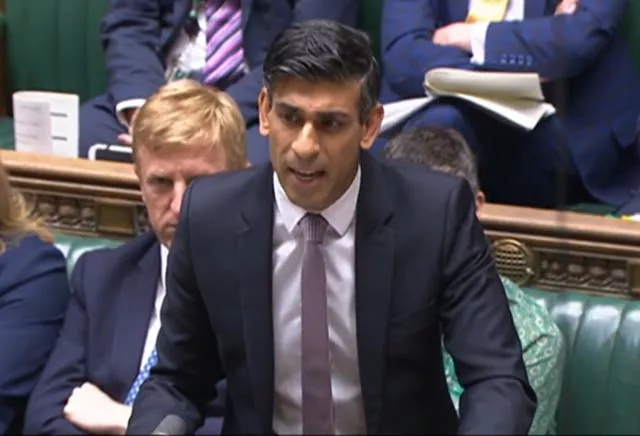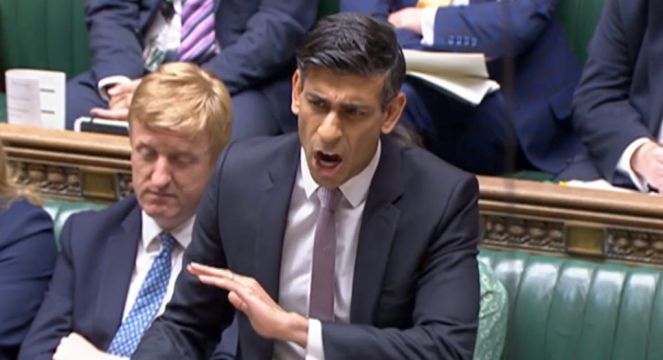Rishi Sunak has faced claims of being “too weak” to block Boris Johnson’s honours list and allowing those who helped “cover up” lawbreaking to become lawmakers.
UK Labour leader Sir Keir Starmer pressed his calls for an immediate general election after also questioning if the British prime minister will block the honours list of his predecessor Liz Truss or “buckle to her as well”.
Mr Sunak countered the attacks at Prime Minister’s Questions by criticising Labour peerage nominations, including that of former MP Tom Watson who now sits in the House of Lords as Lord Watson of Wyre Forest.
Controversy over Lord Watson’s nomination for a life peerage centred on his role in promoting the false claims of a VIP Westminster paedophile ring made by the fantasist Carl Beech, who used the pseudonym “Nick”.
The exchanges at Prime Minister’s Questions came after the Conservatives triggered two difficult by-elections, including in the seat vacated by Mr Johnson.

Mr Starmer used PMQs to focus on Tory infighting, which erupted after Downing Street published Mr Johnson’s honours list on Friday, lacking the names of sitting MPs including former UK culture secretary Nadine Dorries and former minister Nigel Adams.
Hours later Mr Johnson dramatically announced his Commons exit, as the Privileges Committee prepared to report that he lied to Parliament over partygate.
Loyalists Ms Dorries and Mr Adams also said they were standing down as MPs.
The UK prime minister suggested his former boss wanted him to ignore the recommendations of the House of Lords Appointments Commission.
Mr Johnson said he was talking “rubbish” and his camp accused Mr Sunak of having “secretly blocked” the peerages of Ms Dorries and other allies.
A number of senior officials who were implicated in the partygate scandal were included in Mr Johnson’s resignation honours list.

Mr Starmer opened PMQs by asking Mr Sunak why the Conservative Party “spent this last week arguing over which of them gets a peerage”.
Mr Sunak replied: “In line with a long-established convention of previous prime ministers having the ability to submit honours, I followed the process to the letter, in convention of long-standing process.
“It is, by the way, a long-standing convention that prime ministers on both sides to this House have followed in the same way that I did.”
But Mr Starmer said: “The truth is for all his tough talk after the event, the Prime Minister did sign off the honours list. That means that those who threw a Downing Street party the night before the late Queen sat alone at her husband’s funeral will now receive awards from the King.
“If he is so tough, why didn’t he block it?”
The prime minister replied: “As I said, I and the Government followed due process and convention. Prime ministers of both parties have always upheld the convention of non-interference on political honours.
“My predecessors may not have agreed with Labour’s choices of Tom Watson or Shami Chakrabarti, but the same precedent stood then as it does now. And I’d expect a knight like him to understand that.”
Mr Starmer said honours should be for “public service not Tory cronies”, telling the Commons: “Isn’t this this case: He was too weak to block Johnson’s list, and that also means that those who spent their time helping cover up Johnson’s lawbreaking are rewarded by becoming lawmakers for the rest of their lives?”
Echoing the prime minister’s words, Mr Starmer added: “Is his message to the British public ‘if you don’t like it, tough’?”
Mr Sunak replied: “It is right that we use the honours system to recognise people. Almost 2,000 people a year from members of the England Lionesses team to the first Asian police officer in Greater Manchester.
“But he talks about putting people in the House of Lords: perhaps he could explain why he put forward for a peerage the former Labour MP Tom Watson who spread vicious conspiracy theories that were totally and utterly untrue, damaged public discourse and inflicted misery on innocent people?”
Mr Starmer later switched attention to Ms Truss, asking: “Will the Prime Minister block that honours list or will he buckle to her as well?”
Mr Sunak sidestepped the question and instead focused on Labour’s economic policies.

Mr Starmer concluded by calling for a UK general election, saying: “End the boasting, the excuses, the Tory chaos, see if he can finally find somebody, anybody, anywhere to vote for him and call a general election now.”
Mr Sunak replied by criticising Labour for voting against the British government’s immigration reforms and measures to tackle disruptive protests, adding: “We’re getting on and delivering for the country.”
Chief Whip Simon Hart earlier moved a motion known as a “writ” for by-elections in Mr Johnson’s Uxbridge and South Ruislip constituency and Mr Adams’ Selby and Ainsty seat on Wednesday, giving between 21 and 27 working days for votes to be held.
But the third by-election, in Ms Dorries’ Mid Bedfordshire constituency, is on hold because she has not formally resigned as a Tory MP.







